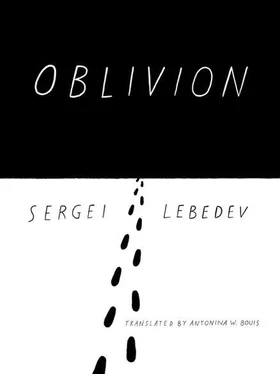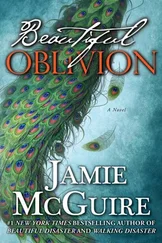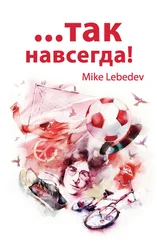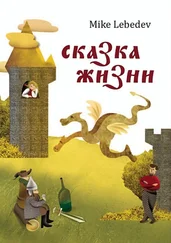I knew it was a man, even though it was just a dark spot— you couldn’t see an animal at that distance; they blend in, live near the ground, feed on the ground, and their every step repeats their gait, which like rhythm in music, exists in the extension of the landscape; an animal lives in the horizontal, its body is extended in it, while a human is a vertical milestone; his movement makes everything around him change, creating a moving axis of coordinates.
A man; I was interested and turned so that I would intersect with him. A half hour later I could observe the stranger.
Attached to his backpack were a large watering can and a strange short-handled rake with very fine teeth. He would stop, move on a bit, then remove moss and lichen from sloping, rounded stones, and then sparingly pour water on them from the can.
He was not young, he moved without quite trusting his body but depending on it; thin, gray-haired, wearing worn oilcloth and swamp boots, weaponless but with rake and watering can; his eyes were focused on the ground.
I have encountered very different tramps in the tundra; some sought precious stones in the hillsides, others rooted around in abandoned settlements for hidden caches; still others collected mammoth tusks in riverbeds, or the remains of an AN-2 which crashed while bringing gold dust from a mine, or just wandering around in the hope of grabbing someone else’s find, whatever it was. There were seekers of ancient pagan temples; madmen who wanted to found a state; collectors of meteorites; and free interpreters of history, looking for traces of Hyperborea.
The man I met—his skills, his experience—suggested he was a prospector, seeking something real; the rake and watering can no longer surprised me, they were clearly tools in his search, but I didn’t know what he was looking for.
Catching up with him, in a long declivity covered by hills from the embankment, I stumbled across a skull. It is impossible to dig a grave in a swamp, but here, in a valley between cliffs, stony soil had accumulated; in a few places it had sunk in even rectangles, the tundra foxes had burrowed in them, and the entrances were revealed by the trampled earth and tufts of fur; the skull was by one of the dens—the foxes had scratched it out of the depth of their burrow.
The fox burrows went into the softened dirt of camp graves; now, when my eyes knew what to look for, I found a rib, a vertebra, a tibia in the moss and rocks; the foxes had extracted and scattered them; the small rodents that destroyed bones were the foxes’ prey, so the bones remained; dirt filled the pores of the bones, which made them dark, primordial, and the rain could not wash them clean. A large orange-cap mushroom grew near a broken collarbone; the cap was contorted by the sun, revealing a sticky and slimy sponge underneath, and this bloodless flesh, which did not know pain, belonging to the lowest kingdom of living organisms, was repulsive; I remembered the mushroom near Grandfather II’s grave; white, doughy, like an old man’s wrinkled ear; human flesh rotted away, but the flesh of mushrooms was renewed, growing from the tiniest spores, and humans were very fragile compared to mushrooms.
We met at the bottom of the hill; the stranger was smoking and boiling water on a smokeless fire; I was walking, the sun shone brilliantly, but inside me was the darkness of the foxhole; the foxes waited for me to leave and leaped up on the hillock behind me, as agile as ghosts; they froze amid the stones, low to the ground, pointy-eared—not animals but hatchlings of tundra gods that feed on the misery of others, the aborigines of pestilential places.
The stranger was armed, after all; he was clever, people would think he was unarmed if they didn’t see a rifle, but he had a handgun, which he aimed at me while shading his eyes from the sun. The gun was no threat; I was in that state I had felt when the black dog attacked me—the man, sensing my weakness, put away the gun, gesturing at the stone slabs. He’d raked the turf and washed off what remained with water; now the water was evaporating on the slabs.
The light stone revealed chiseled drawings; some the size of my hand, others bigger than a man’s height. There were rolling wheels—suns with spokes; flowers with four petals, like a cross; large and small fish, swimming in various directions; crooked and straight lines, furrows in the stone; flattened beavers, the way skins are spread out; dozens of deer wandering in a long herd; hunters following the deer and catching them with unnaturally long spears; chains of bear tracks, birds with bony wings and harpy beaks; animals that look like an animated saw with a snail’s head; boats and snowshoes; dogs turned upside down as if in space orbit; triangular eyes with oval pupils; a gaping circle—the way the vagina is depicted in anatomical atlases; a round woman with short legs and arms, and inside her, head down, a child floats weightlessly; a man with an incredibly long, snake-like penis that makes him resemble a spermatozoon; axes and oars; animals, people, whales, pulled together by threads like umbilical cords growing out of one another, a mixture of differences, miscegenation of everything living.
The drawings were alive, breathing like fish roe in the warm water of shallows; it seemed they even had a fragrance, spicy, voluptuous; the figures and ornaments met, combined, flew apart, and it was a single act of creating life; the power of the drawings made the earthy black of the fox den vanish from within me; the drawings were not art, not depictions—they were elemental, as if the existence of the people who had made them was transferred completely, without remnant, into them.
They were petroglyphs; I knew they were occasionally found in the tundra here; they were left by tribes that had lived seven or eight thousand years before our era. But at the moment I wasn’t thinking about that.
There is a special sense of day in the tundra; a day is an enclosed space, something three-dimensional; in the tundra, where you need not glasses but binoculars, where the summer sun almost never sets, this room of the day is particularly spacious; here in the high latitudes where the meridians almost meet and the parallels are small circles, day reigns, an enormous vault, a single day for the entire world; astronomically that is not correct but that is the true impression.
The stranger gave me a mug; the overbrewed tea was bitter, but the bitterness gently and willfully prompted my heart, making it beat harder and faster, invigorating me and giving me strength.
“You’re not following me?” the man asked.
Despite his gun, he was afraid; he would not have hurt me and he knew it.
“People follow me,” the man said. “Think I’ll lead them to the petroglyphs.” He pointed to the drawings. “You can get money for them, if you can break them from the stone and get them out.”
The light and the shadows lessened at last; the stone suns dimmed and the earth’s darkness melted away. The tension of feeling eased and I saw the man clearly, in full detail.
He had cancer: his face seemed to be inflated from inside, like the caricatures made by street artists, exaggerating lips, cheeks, all the flesh of the face; the overgrown flesh of his lips sagged, the cheeks covered his eyes, the mouth was double in length, and not a single hair grew on his smooth sausage skin.
“This is from radiation,” he said. “What’s inside my body is worse. The gun—it was given to me as an award—is for shooting myself when I can’t stand it anymore.”
My unexpected comrade was a military man; long ago he had looked for places in this tundra for underground nuclear tests; he had come from a region with forests and did not know that the tundra could make you lost as well, like a forest, but in a different way: the forest changes where the light is coming from, confuses tracks, while the tundra is open, you can see everything, but suddenly you look around, nothing but hillocks, and your mind, busy with thoughts, has not retained any orientation markers.
Читать дальше












